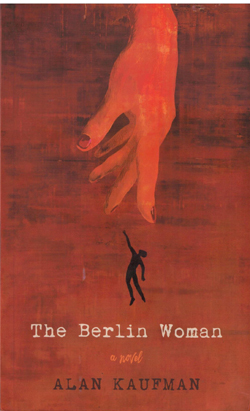The Berlin Woman by Alan Kaufman, Mandel Vilar Press, 2019; ISBN 8781942-134589; 213 pages, $16.95

 SAN DIEGO –I’m sure a psychiatrist could provide far more incisive insights into this troubled novel than I can, but at least I can give you the flavor of it, along with a warning that if it were a movie it would be rated XXX.
SAN DIEGO –I’m sure a psychiatrist could provide far more incisive insights into this troubled novel than I can, but at least I can give you the flavor of it, along with a warning that if it were a movie it would be rated XXX.
Nathan, the protagonist in this novel, is a second generation survivor, who sees a world that is unrepentant and uncaring about the Holocaust, and which may, in fact, be on the verge of launching another one.
Here is what Nathan says at a lecture during a European book tour:
I write about what it feels like to be a child who is alternatively loved and beaten by his mother because her experiences in the Holocaust drove her mad, as well they should have! I write about what it feels like at the age of eight to discover that before my birth, people – Austrians and Germans in particular – slaughtered six million of my kin—men, women, children—and that really no one has ever paid for the crime. Furthermore, the descendants of the killers—whole nations of killers, really – Germany, Austria, Poland, Hungary, France, Lithuania, Italy, Ukraine and many more—even the people in this room—not only live as though it never occurred but sit here talking about love and go out and vilify the Jews of Israel with smug so-called ‘Progressive’ post-modern notions of political truth unaffirmed by any sense of reality. Some of them even justify killing Jews all over again!
In contrast to Nathan is Lena, a Ukrainian Jewish writer whose works have been successful in German translation. Her family members were lined up naked in front of a trench and shot with sufficient precision to make them fall neatly into their mass grave. Lena, the Berlin Woman, is Nathan’s love interest, who like his mother alternatively loves and beats him—psychologically at least. She sneers at his work:
The multiculturalists distrust you. The Right thinks you’re soft. Instead of carnival-barking about the Holocaust, you should talk about human rights outrages in Indonesia … [and] the Philippines, where death squads execute drug addicts and drunks in the streets… Paint in broad strokes. Make complex statements that no one understands. Mention the UN and the Hague. Go on about injustices – publishers love that shit. Wear your hair in corn rows. Apologize for being a Jewish writer. The Holocaust was too big for the goyim to wrap their brains around, even though they committed it. And now everyone hates Israel…
Two second-generation survivors, inheritors of the Holocaust, they take each other to bed—not for tender, loving, solace. The bedroom is a battleground for them, where they can try, never successfully, to satiate their rage on each other with each orgasm.
Lena is married and has another lover in addition to Nathan. Nevertheless, Nathan is obsessed with her. She treats him as a plaything, until he “ghosts” her on his social media. Then roles are reversed—at least for a while.
However unfairly Nathan believes he is treated by Lena, he certainly is no moral exemplar. After he has sex with women who for one reason or another are smitten by him, he drops them unceremoniously, caring no more for their feelings than Lena seemingly cares for his.
Reading this novel, I was reminded of experiments in which one person is nasty to another, prompting the recipient to be aggressive to a third person, and that person, in turn, being hypercritical of a fourth, and so on down the line. The purpose of the experiments was to show that this chain-reaction process also could work with random kindness – you’ve probably seen such commercials on television.
In this book, Nathan and Lena are too tormented to manifest much kindness for themselves, for each other, nor for anyone else.
*
Harrison is editor of San Diego Jewish World. He may be contacted via donald.harrison@sdjewishworld.com